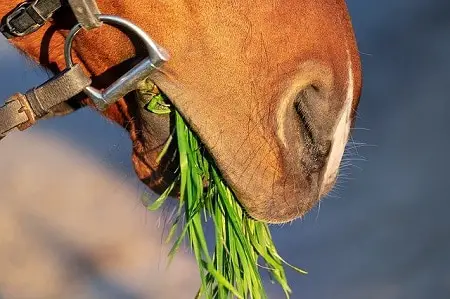A horse’s diet is an important component in their overall health and well-being. Hay is a staple for most horses, but hay can be expensive and not readily available to some owners.
The good news is that there are many other options you can feed your horse instead of hay!
So if you happen to be wondering, “What can I feed my horse instead of hay?” or if you’re looking to cut back on the cost of hay or want to find an alternative? There are many other things that can be fed to your horse instead of hay, such as beet pulp, oats, barley, wheat bran, and corn.
Hay and haylage are essential to a horse’s diet, but what if they have bad teeth or laminitis? In that case, you will need to provide them with something else – a hay replacer.
Horses in winter also have a difficult time finding enough hay to eat, but this is also the season where owners will be thinking about supplementing their horse’s grazing with additional forage. If poor teeth or clinical conditions such as laminitis mean that their regular feed is longer suitable, then feeding them with a quality-controlled alternative will become essential.

Choosing Horse Feed Hay Replacements
- If you are going to use a fiber supplement, then I recommend using those that have shorter chopped fibers. This way, the food will feel more substantial in your horses mouth.
- When preparing feeds for horses, you should always consider their digestive health. Although many grain and grasses are ideal for feeding your horse, some types of fibre might not be so digestible by them. To help your horse get the most out of his feed if it’s not able to chew short chopped fibre, you can soak the feeds in order to create a mash.
- Hay is a critical component of equine nutrition. The majority of the horse’s energy should come from hay. However, replacement horse feed can account for up to 20% of the total diet, making it necessary to supplement with other feeds like sugar beet and ‘pure’ alfalfa pellets/ chaffs.
- Caution should be used when giving your horse only grass based products to consume as they may contain high levels of water soluble carbs, and can lead to a condition called Founders in horses.
- When it comes to feeding your horse, you need the right balance of vitamins and minerals. A nutritionist can help guide this process; however, be wary that some hay replacers may contain high levels of certain ingredients such as calcium.
How Long can Horses go without Hay?
Horses are herbivores, which means they eat primarily grasses and other plant material. In the wild, horses graze on pasture for up to 18 hours a day.

Horses like to graze and will often be found foraging during the day. It is important that they do not go more than 3-4 hours without grazing because their stomachs are designed with a specific diet in mind, just as ours are.
When it comes to hay or other vegetation-based foods in captivity, most domesticated horses require between 6-8 pounds per day depending on the size of the animal. Horses in captivity should never go without hay as it provides them with essential nutrients needed by their bodies as well as helps prevent obesity and various diseases such as colic and laminitis.
When feeding your horse hay, it is important to remember the following;
- Hay is an essential part of a horse’s diet
- Horses can eat up to 40 pounds of hay per day
- The most common types of hay are timothy, orchard grass, and alfalfa
- Timothy hay is the cheapest type of hay for horses
- Alfalfa has more protein than other types of hay and it costs more than timothy orchard grass
- Orchard grass has less protein than alfalfa but it also costs less
- You should feed your horse about 1-2% of its body weight in dry matter each day
Will a Horse Stop Eating when Full?
The question of whether or not a horse will stop eating when they are full is one that many horse owners struggle with. Some horses refuse to stop grazing, eat their hay and other food at the same time, and then go back for seconds. Other horses will only eat until they are about 3/4 full before walking away from their food source.
When a horse is full it may show signs of being full such as licking its lips, chewing with the mouth closed or not chewing at all because they can’t fit any more food into their mouths. Some horses might also push away hay if they’re done eating or turn their head to avoid getting close to the hay pile.
Some horses have a habit that many people find frustrating – when horses eat too much forage in one sitting. This can often lead to stomach problems during digestion or being unable to walk properly due to an upset gut.

